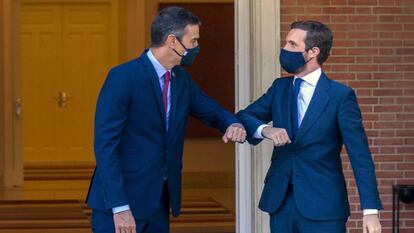PP chief says he won’t do deal with government on budget, renewal of institutions
Pablo Casado says he will not give the coalition his party’s support while the PSOE continues to govern with junior partner Unidas Podemos

Not even the coronavirus pandemic has changed the political dynamics between the two main parties in Spain. The leader of the main opposition Popular Party (PP), Pablo Casado, spent two hours in talks on Wednesday with Socialist Party (PSOE) Prime Minister Pedro Sánchez, only to announce afterwards that his group would not lend the support needed in order to make new appointments in key institutions such as the Constitutional Court and the CGPJ legal watchdog.
Casado said that the PP would not provide the votes needed for such changes while the PSOE continued to govern in a coalition with junior partner Unidas Podemos, the leftist bloc headed by Pablo Iglesias and made up of his Podemos party and the United Left (IU).
In response, the Sánchez government has accused Casado of refusing to recognize the legitimacy of the coalition government. With his actions, Casado is also rejecting the “political truce” that the leader of the center-right Ciudadanos party, Inés Arrimadas, called for on Wednesday after having met with Sánchez. “We will all be judged for our actions during the pandemic,” Arrimadas said after her talks with the prime minister, at which the possibility of her party supporting the upcoming budget plan was a key issue.
Casado is arguing that he is putting the brakes on the appointments in order to defend the constitutional structure of Spain
Casado’s refusal to do deals with the PSOE while Unidas Podemos forms part of the government could mean yet further delays to the reorganization of key institutions such as the CGPJ legal watchdog, which has already been pending new appointments for two years. The situation could now be prolonged for an unprecedented five years, until the current political term comes to an end.
The PSOE-Unidas Podemos administration does not have a working majority in Spain’s lower house of parliament, the Congress of Deputies, and as such needs support from other groups in order to pass legislation. However, for the renewal of institutions such as the CGPJ, 210 votes are needed, well beyond the majority of 176 in the 350-seat Congress, and something that will only be possible with the support of the PP.
Government spokesperson María Jesús Montero accused the conservative party of “going against the Constitution” given that the renewal of the institution is laid out in the text. Casado, however, is arguing that he is putting the brakes on the appointments in order to defend the constitutional structure of Spain, on the basis that reaching a deal with the government would imply accepting Unidas Podemos as a party – which, he claims, is “against the constitutional regime” of Spain on the basis that the group rejects the Spanish monarchy, criticizes the justice system and is currently embroiled in a court probe into alleged irregular financing.
“If we are going to negotiate with someone who is calling for the demolition of the Constitution, that is a bad start,” said Casado about Unidas Podemos. “If there is a party that is implicated in illegal financing, it is the government that has the problem.” Casado also made clear that his party would not negotiate the upcoming budget with the administration either – given the political stalemate in Spain of recent years, the country is still operating under the financial blueprint approved by the PP government of Mariano Rajoy back in 2018.
Pressure from judicial sector
The other key institutions that need the support of the PP for renewal include the Constitutional Court, the governing board of the state broadcaster RTVE and the Ombudsman’s Office. The judicial sector is putting pressure on Casado to do a deal, but he is ruling it out.
This is the second time since Spain returned to democracy that such a situation has occurred – the first occasion was also under a PSOE government with the PP in opposition. The impasse lasted two years in that case however, not as long as five.
Casado’s attitude is in contrast to that of Ciudadanos leader Inés Arrimadas, who yesterday confirmed her “firm and real” commitment to negotiate a “moderate, sensible” budget, one that incorporates the financial assistance from the European Union to deal with the coronavirus pandemic and accompanying economic crisis, “and that do not contain ideologies contrary to what this country needs.” She accepted that Unidas Podemos would form part of these talks. “We may make mistakes,” she said of the need for the aforementioned “political truce,” but “we will be able to sleep with a clear conscience,” she concluded.
English version by Simon Hunter.
Tu suscripción se está usando en otro dispositivo
¿Quieres añadir otro usuario a tu suscripción?
Si continúas leyendo en este dispositivo, no se podrá leer en el otro.
FlechaTu suscripción se está usando en otro dispositivo y solo puedes acceder a EL PAÍS desde un dispositivo a la vez.
Si quieres compartir tu cuenta, cambia tu suscripción a la modalidad Premium, así podrás añadir otro usuario. Cada uno accederá con su propia cuenta de email, lo que os permitirá personalizar vuestra experiencia en EL PAÍS.
¿Tienes una suscripción de empresa? Accede aquí para contratar más cuentas.
En el caso de no saber quién está usando tu cuenta, te recomendamos cambiar tu contraseña aquí.
Si decides continuar compartiendo tu cuenta, este mensaje se mostrará en tu dispositivo y en el de la otra persona que está usando tu cuenta de forma indefinida, afectando a tu experiencia de lectura. Puedes consultar aquí los términos y condiciones de la suscripción digital.








































